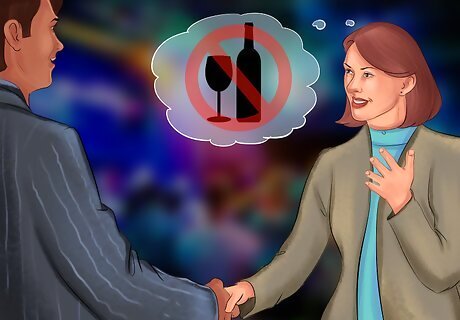
views
Saying No Kindly

Say no directly. If someone offers you alcohol, the best and easiest response is a simple, "No, thanks." Oftentimes people will not push you for a reason and respect your choices. Should the person offering question you, you can try more detailed responses. For example, you could say, "Thanks, but I'm the designated driver."

Be polite, but firm. Have confidence in your reasons not to drink. Sometimes saying no can make you feel boring. But understanding your reasons for sobriety and standing by them will help others know that you're serious. Complimenting the person can help them respect your decision. You could say, "It means so much that you'd think of me, but I'm not drinking tonight." If someone challenges your refusal, you could tell them that you feel uncomfortable when they disrespect your choices.

Turn down a drink with humor. Humor can lighten up a situation. You can use jokes to distract your friends from the situation, especially if they don't drop the conversation. Try saying something like, "Nah, man, I've already had my share. And probably yours, too!" Or, "Haha, no thanks. No drink in the world could have enough alcohol to solve my problems." Keep your jokes polite and tasteful. Others might feel attacked if you insult them for drinking.

Ask for a non-alcoholic drink as an alternative. Having a non-alcoholic drink in hand will make others less likely to offer you a drink. Ask the bartender for your favorite soda, or go for a water if you're cutting back sugary drinks in general. If you opt for a virgin drink (like an Arnold Palmer or Shirley Temple), others will probably not even notice. Many cocktails can be ordered "virgin," or without alcohol. Try a virgin piña colada or daiquiri. Most bars are beginning to stock non-alcoholic beers as well, so you could give one of these a try.
Refusing Persistent Offers

Repeat yourself. If someone continually offers you a drink, don't be afraid to sound like a broken record. Restate yourself and firmly tell them you won't be drinking tonight. You don't owe anyone an explanation you don't want to give.

Explain your reasons for staying sober, if you want to. Maybe your doctor advised you to give up drinking or you're training for an athletic competition. Maybe you're pregnant and don't want to harm the baby. Whatever your reason, state it calmly and answer any questions you feel comfortable with. For example, you could say, "Hey, I appreciate the offer, but I don't drink for religious reasons." Or you could say, "You know, I'm a recovering alcoholic and am 2 years sober. It'd be a shame to break the streak now."

Change the subject. Turn their attention elsewhere, if someone persistently offers you a drink. Maybe you could ask if anyone else wants the drink, or you could use the subject of drinks to bring up a new juice cleanse you want to try. Complimenting is a great means of distraction, as the attention shifts from you to the other person. You could say, for example, "Wow, you're always looking out for me. You are such a good friend! How are you holding up lately? Did you finish that presentation you were stressing over?"

Have an escape plan, if you feel cornered. Prepare a backup plan with your friends beforehand, and involve others in it. Tell a trusted friend or family member about this special event, and ask them if you can call them if you feel pressured. If you're underage, have a code word with your parents. That way, they can pick you up if uncomfortable situations arise. If your code word is "third period Biology" for example, you could call them and say, "I just met a guy from my third period Biology class here, small world!"
Avoid giving in. It can be hard to keep refusing a drink when people are pressuring you, but you can resist them! You likely have a good reason for not drinking, so keep that in mind. Don't let others sway your decision. Stand firm and tell them you do not want a drink.

Don't spend time with people who disrespect you. Friends who don't respect your choices do not have your best interests in mind. Walk away from people who pressure you into drinking, and avoid situations around them that involve alcohol. Make friends with people who accept your decisions, even if they don't understand them.
Planning Before You Go

Become the designated driver. If you're driving to this event in a group, offer to be the designated driver. Having a reason to stay sober will help others respect your decision. Very few people will offer a drink to someone who's driving people home afterward. If they do, you'll have an understandable excuse. Spend time with other designated drivers when at the party or special event. There is often strength in numbers when it comes to peer pressure.

Let your friends know so you have allies. Go with a group to this special event, and let them know beforehand you don't plan to drink. You can tell them why if you feel comfortable, or you can just tell them you're cutting back on alcohol. Your friends can offer their support if others start pressuring you. Choose friends you trust and know will respect your decision. If you have a friend who also doesn't drink, ask them to come. Don't rely too heavily on your friends' support. You may spend time without them at this event and will need your own motivation.

Give the host an advance notice, if applicable. Tell the host you do not drink to avoid awkward situations. Your host will them know not to offer you a drink or toast with you. You can avoid hurting their feelings, and they can avoid putting you in an uncomfortable situation.

Prepare a few stock phrases in advance. Decide on a few phrases you will say beforehand if someone offers you a drink. If you don't plan a response or two, you might feel tongue-tied when the moment comes. Your response doesn't have to be vulnerable or complicated: even a simple, "I appreciate it, but no thanks!" will do.

Avoid situations where you know you'll be triggered. If you think you might be tempted, stay away from people or places you might give into pressure. Drinking when you've decided not to will only hurt your self-respect in the long run. Prevent putting yourself in a compromising situation by avoiding it entirely. Ask yourself personal questions if you feel pressured: why do I want to give in? What will I lose if I have a drink? What's more important: long-term satisfaction or short-term comfort? Don't let anyone or anything compromise your personal convictions.



















Comments
0 comment